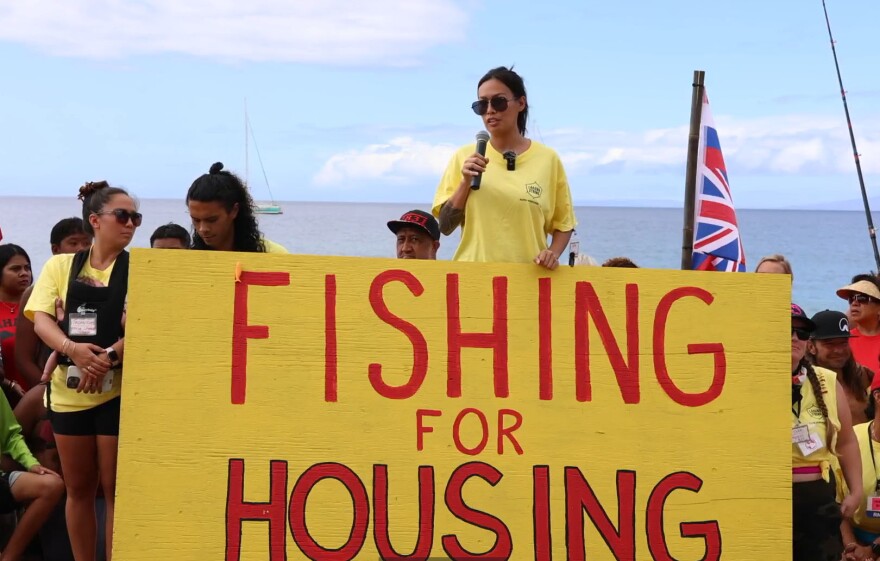Lahaina resident Charles Nahale spent the first days after the fire without a bed.
“I slept in the car. I slept on chairs,” he recalled. “A kind person put their arm around my shoulder and said, 'We don't have hot water, we don't have internet or cellular, but we got a shower, it's cold water, and an extra bed.' I slept there for two days.”
He found a condo in West Maui before his stay came to an abrupt end.

“I was there for, gosh, about a month and a half, I think, before one day I got a knock on the door from security who said I should have checked out two hours ago. I'm like, what? I had no notification.”
He is still in temporary housing and gets anxious thinking about when the Red Cross might tell him he has to move next.
Nahale says he and fellow Lahaina residents are now facing a secondary crisis.
“We have an ongoing second wave of humanitarian disaster now. We still have about 7,000 people that are still displaced and we haven't had the opportunity to heal because some people have had to move seven, eight, nine times in four months,” he said. “When you're concerned about the essentials of life, it's hard to begin to heal from what has happened.”
Amid a housing shortage and more than 24,000 vacation rentals or second homes available on Maui, lawmakers are urging short-term rental owners to allow fire survivors to rent their units on a long-term basis.
Last week, Gov. Josh Green said he’s prepared to use emergency orders if vacation rental owners don’t assist voluntarily.
Nahale said that’s the first time he’s felt heard and supported by the governor since the fire.
Courtney Lazo lost the Lahaina home she and her family lived in for five generations.
“It's so draining,” she explained. “I think not even just the physical action of being shuffled around, but the anticipating when is it going to happen? Can we unpack our containers or garbage bags of belongings? How do you start to heal and start to rebuild your life and create some sense of new normal, if you can't even unpack?”
Lazo is one of the organizers of the Fishing for Housing movement spearheaded by Lahaina Strong. A group of Lahaina residents have been staked out at the popular Kā’anapali Beach for nearly a month and a half. They say they’ll stay there as long as it takes to secure dignified, long-term housing.
“I like that we're down here at the beach and it's a constant reminder for everyone — this is the reality that the community is facing and they can't just sweep it under the rug and pretend it doesn't exist,” she said.
But they also have a front-row view of tourism, bringing more reminders that their lives have been shattered.
“My son had made a comment and he was like, ‘That really sucks to see people here enjoying themselves on vacation, and we can't even go home’ and he said, ‘Mom, I just want to go home,’” Lazo said. “And that sucks, you know? How do you explain that to them? There're really no words to justify why people choose to vacation in a place like this.”
She added that some visitors want to learn and raise awareness about the fire. But others aren’t as respectful.

“Some people are really pissed off that they paid all this money to come to a burnt-down town, nothing to do, or they will say things like, ‘Why don't you guys just move? Or why are you waiting for handouts from the government?” Lazo said.
Nahale doesn’t feel tourism should be opened up in West Maui yet.
“It's like, who invited you to the funeral? In your bathing suits and sipping on a Mai Tai when people are just trying to figure out how they're going to survive physically, emotionally, materially, spiritually,” he said.
Lazo said her family has found a long-term rental but can’t move in until their assistance application is processed. And that has been harder than she ever imagined.
“I'm in the process of getting FEMA rental assistance, but that whole process has been really hard to navigate and I think they lost my application like twice,” she said. “I've had to fill out the same document multiple times because I go and fill it out and then they can't find it.”
She said she’s familiar with the forms process and completes contracts for work. But even after many in-person visits to the desks of multiple agencies, she’s still waiting.
“I'm still in the process of trying to get it sorted out, but they definitely don't make it easy. This is why people don't come here and get help. I can't imagine what it's like for those who aren’t [tech savvy], or maybe kūpuna or elderly that don't have someone to hold their hand and help them. I understand why people give up and they're like, oh, forget it.”
Both Lazo and Nahale have been told they won’t be kicked out of their current housing through the holidays.
“From what we understand, Red Cross has secured contracts through the holidays until at least Jan. 5, so nobody should be moving, at least property to property,” Lazo said.
In the meantime, they’re taking it one day at a time.







